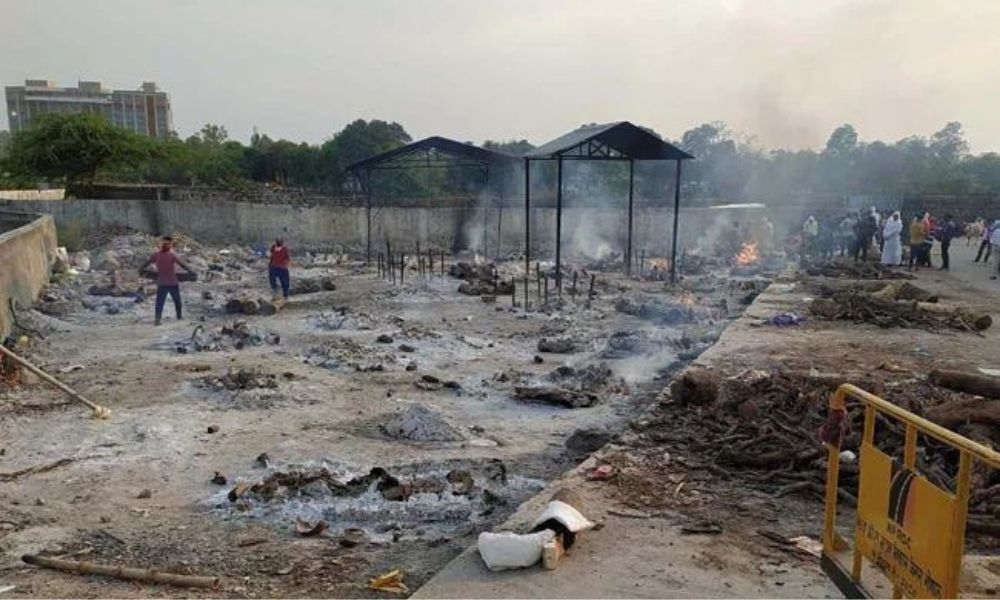
Image Credit: NDTV
Opinion: How To Build Strong, Resilient COVID-19 Response Now And Avoid Further Disaster?
India, 12 May 2021 10:57 AM GMT
Creatives : Rakshitha R |
Rakshitha an engineer turned passionate journalist with an inclination for poetry, creative writing, movies, fiction, mountains and seclusion. Not a part of the social process but existential.
Guest Author : Seemant Dadwal
Seemant Dadwal is the founder of the Meraki Foundation. An IIM Bangalore alumni whose experience as a primary grade teacher with Teach for India shaped his decade-long career at the intersection of policy, data, technology, and community.
Responsible civil society in partnership with the district administration is one way to overcome this massive challenge which cannot be upended by few individuals.
The last few weeks have been one of the most turbulent and strenuous times that our country has been through. Our already fragile healthcare system coupled with a lack of political and administrative foresight could not grapple with the demands of the second wave of the COVID-19 pandemic; resulting in unparalleled destruction of the kind one has rarely seen.
The Ministry of health itself has found that 80% of cases are asymptomatic (confirmed by BMC, Mumbai in February) and around 5% are critical cases. Given the volume of deaths, it means a lot of patients have died not just because of the disease but also because they either didn't get tested early enough (hence didn't get the right guidance at the right time) or they didn't get the appropriate governmental support around oxygen, hospital beds, essential medicines when they needed it the most.
Lack of institutional support forced a large majority of, let's face it - mostly sleepy, civil society to wake up primarily because the threat to our own lives or our loved ones became real. And that's when the drive to reduce demand-supply gaps of oxygen cylinders/concentrators, Remdesivir, and other drugs heightened. Some of us went out of our houses, stood in lines, some stayed indoors copy-pasting one message from one group/platform to another group/ platform asking for essentials or delivering the rare good news of their availability. Social media, and in extension our lives, became abuzz with COVID-19 relief, (mostly) bad news with a sliver of good news; especially if you were in Delhi.
If knowing a COVID-19 +ve patient became normal in the first wave, knowing someone who passed away was the new normal in the second wave.
Since the shortages started showing their ugly head around 3 weeks ago, Oxygen and medicine supplies within India have increasingly been regulated by the government to ensure there's less hoarding, overcharging or black-marketing of these essentials. Additionally, governments, private individuals and organisations (including philanthropists, investors, hospitals, not-for-profits) have since been making efforts to acquire these essentials overseas.
Going forward, both these facts collectively make individual efforts on matching supply-demand, especially in the absence of significant financial resources, slightly less effective than even a week ago. Therefore, a majority of us who's moved by the state of our country/ its citizens - brought down on its knees - should find newer avenues to contribute.
What can we do? Turns out, a lot
At this time, we need consistent, sustained efforts to solve the challenges of withering healthcare infrastructure, scarce medical manpower as well as the wide diversity of landscape (rural, urban, tribal) that India possesses if we're to see the back of this pandemic. Given the pace achieved (as of May 3), vaccinating 70% of all Indians-the herd immunity threshold-will take 2 years & 9 months. Therefore, even if we survive the second wave, there will always be a risk of another wave until a significant majority of us gets vaccinated.
However, we can do better if we a) consistently hold our political, administrative leadership accountable for filling demand-supply gaps b) find the active citizen within us to partner with our last lines of defence against COVID-19; district-level bureaucracy and health departments - most of whom are swamped, understaffed, firefighting on a daily basis and (some) losing motivation by the day. This article specifically talks about the second approach.
What should your efforts focus on?
The first step would be to approach your DA and ask, but based on my experience of working directly with district administrations (DA), here are three things that private individuals/groups can focus on currently:
1. Raising Awareness (even for non-smartphone users), in your district, about early testing/testing centres, vaccination/vaccination centres, hospitals treating covid-19 patients. Information around scarce resources such as L2/L3 beds, vaccination slots have already begun and should continue.
2. Contribute resources, essential supplies such as patient medical kits, food ration kits, transportation with drivers etc, in case there's a shortage in your district.
3. Facilitating and strengthening coordination between local bureaucracy, health departments, civil society and private hospitals/suppliers - so they work in tandem to ensure your district comes out stronger.
Efforts along these lines by civil society will not just add much needed "feet/hands on the ground", motivate the stressed out bureaucratic machinery but also help release the pressure of a system that has been pushed beyond its limits.
How to approach district administration?
1. Write an email, such as this (edit, before sending).
2. Or seek an appointment/show up during the time reserved for public dealings.
Here are a few ideas on how you can support your district administration:
1. Ask your DM/DC, about the help needed, and sign up for it unconditionally.
2. Oxygen Sufficiency: If needed, you can work with DA on a plan for your district to be oxygen sufficient- not just for now- but for the next year.
3. Set up a calling campaign: This will free up the DA from non-technical work, in turn allowing them to focus on addressing immediate challenges. Calling campaigns can help:
a) Trace 100% COVID +ve patients so they get the right support immediately are testing positive
b) Track 100% COVID +ve patients so they get the right support at the right time during their COVID+ve lifecycle
c) Help coordinate work across different stakeholders (NGOs, civil society groups) who might be working on relief around food, medicines, beds etc
4. Help set up ambulances and/or mortuary vans (with drivers); in case there's a shortage
5. Help set up community kitchens to serve covid+ve patients and or even hospital staff; adds goodwill and a sense of camaraderie in the community.
6. Assist in crucial activities such as documentation/presentations/training; frees up time for officers to focus on more pressing needs.
7. Assist in cleaning up, managing, analyzing data. In case there's the absence of technical resources, districts will highly appreciate someone who's Excel-comfortable. This will save time as well as resource-persons (like medical staff who can conduct more on-ground tasks and teachers who can return to teaching) during this time.
8. Make public service video content/posters/web-pages (e.g.: https://merakifoundation.in/covid-kit/) on reducing information gaps about COVID-19: symptoms, treatments, resources available specific to your district in your local language. There is a massive lack of correct, locally accessible information.
Responsible civil society in partnership with the district administration is one way to overcome this massive challenge which cannot be upended by few individuals. It needs a partnership and we must rise up to this challenge to become responsible and responsive to the needs of our cities, towns, villages fighting for survival. If we don't, sadly this time, time and body count will tell.
Also Read: Chennai's Trans Community Kitchen Lights Up Hope As They Serve Free Food To Needy
 All section
All section














